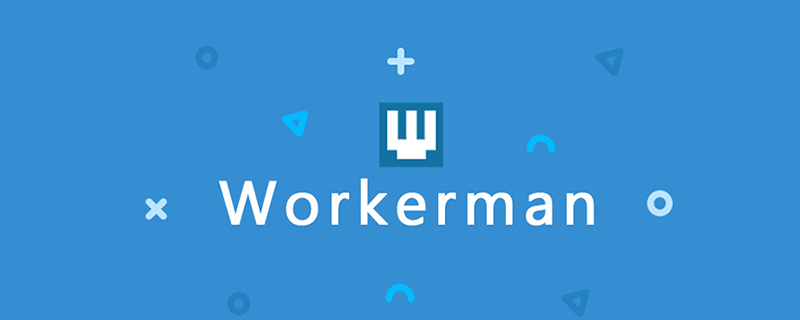How to run workerman on docker?
How to run workerman on docker? The following article will introduce to you how to run workerman with docker. It has certain reference value. Friends in need can refer to it. I hope it will be helpful to everyone.

Related recommendations: "workerman Tutorial"
Deploy the gatawayWorker project on docker, and use mysql and redis## in the project
#Install mysqlPull the imagedocker pull mysql:5.7
docker run -d -p 3306:3306 -e MYSQL_ROOT_PASSWORD=root --name m_mysql mysql:5.7
-p port mapping, the front is the host port, the back Is the container port that needs to be mapped
-e Set the environment variable, MYSQL_ROOT_PASSWORD is the initial password of the mysql root user
--name is the only name of the container
docker exec -it m_mysql /bin/bash
| Option abbreviation | Description | |
|---|---|---|
| -d | Run the container in the background and print the container ID. | |
| -i | Keep standard input open even if there is no connection, usually used with -t. | |
| -t | Allocates a pseudo-tty, usually used with -i. |
mysql -uroot -proot use mysql GRANT ALL PRIVILEGES ON *.* TO 'root'@'%' IDENTIFIED BY 'root' WITH GRANT OPTION; FLUSH PRIVILEGES;
This way you can connect through the public network
Install php
Pull Mirror
docker pull php:7.3-cli
Run
docker run --name myphp -p 8282:8282 -v /home/wwwroot:/www -d php:7.3-fpm
-p Add host to container port mapping to map the 8282 that needs to be used. Multiple ports can be used multiple times -p
-v Add directory Mapping Put the project under /home/wwwroot, and the environment required to install workererman will automatically appear in the containerapt-get install libevent-dev
apt-get install libevent-dev docker-php-ext-install pcntl sockets docker-php-ext-install event docker-php-ext-install pdo_mysql docker-php-ext-install redis
php start.php start -d
For more programming-related knowledge, please visit:  Introduction to Programming
Introduction to Programming
The above is the detailed content of How to run workerman on docker?. For more information, please follow other related articles on the PHP Chinese website!

Hot AI Tools

Undresser.AI Undress
AI-powered app for creating realistic nude photos

AI Clothes Remover
Online AI tool for removing clothes from photos.

Undress AI Tool
Undress images for free

Clothoff.io
AI clothes remover

Video Face Swap
Swap faces in any video effortlessly with our completely free AI face swap tool!

Hot Article

Hot Tools

Notepad++7.3.1
Easy-to-use and free code editor

SublimeText3 Chinese version
Chinese version, very easy to use

Zend Studio 13.0.1
Powerful PHP integrated development environment

Dreamweaver CS6
Visual web development tools

SublimeText3 Mac version
God-level code editing software (SublimeText3)

Hot Topics
 How to exit the container by docker
Apr 15, 2025 pm 12:15 PM
How to exit the container by docker
Apr 15, 2025 pm 12:15 PM
Four ways to exit Docker container: Use Ctrl D in the container terminal Enter exit command in the container terminal Use docker stop <container_name> Command Use docker kill <container_name> command in the host terminal (force exit)
 How to copy files in docker to outside
Apr 15, 2025 pm 12:12 PM
How to copy files in docker to outside
Apr 15, 2025 pm 12:12 PM
Methods for copying files to external hosts in Docker: Use the docker cp command: Execute docker cp [Options] <Container Path> <Host Path>. Using data volumes: Create a directory on the host, and use the -v parameter to mount the directory into the container when creating the container to achieve bidirectional file synchronization.
 How to restart docker
Apr 15, 2025 pm 12:06 PM
How to restart docker
Apr 15, 2025 pm 12:06 PM
How to restart the Docker container: get the container ID (docker ps); stop the container (docker stop <container_id>); start the container (docker start <container_id>); verify that the restart is successful (docker ps). Other methods: Docker Compose (docker-compose restart) or Docker API (see Docker documentation).
 How to check the name of the docker container
Apr 15, 2025 pm 12:21 PM
How to check the name of the docker container
Apr 15, 2025 pm 12:21 PM
You can query the Docker container name by following the steps: List all containers (docker ps). Filter the container list (using the grep command). Gets the container name (located in the "NAMES" column).
 How to start mysql by docker
Apr 15, 2025 pm 12:09 PM
How to start mysql by docker
Apr 15, 2025 pm 12:09 PM
The process of starting MySQL in Docker consists of the following steps: Pull the MySQL image to create and start the container, set the root user password, and map the port verification connection Create the database and the user grants all permissions to the database
 How to start containers by docker
Apr 15, 2025 pm 12:27 PM
How to start containers by docker
Apr 15, 2025 pm 12:27 PM
Docker container startup steps: Pull the container image: Run "docker pull [mirror name]". Create a container: Use "docker create [options] [mirror name] [commands and parameters]". Start the container: Execute "docker start [Container name or ID]". Check container status: Verify that the container is running with "docker ps".
 How to update the image of docker
Apr 15, 2025 pm 12:03 PM
How to update the image of docker
Apr 15, 2025 pm 12:03 PM
The steps to update a Docker image are as follows: Pull the latest image tag New image Delete the old image for a specific tag (optional) Restart the container (if needed)
 How to create containers for docker
Apr 15, 2025 pm 12:18 PM
How to create containers for docker
Apr 15, 2025 pm 12:18 PM
Create a container in Docker: 1. Pull the image: docker pull [mirror name] 2. Create a container: docker run [Options] [mirror name] [Command] 3. Start the container: docker start [Container name]






